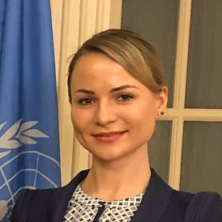A stateless person (SP) is not allowed to work legally, officially own a house or other property, use banking services, receive assistance from the state, or see a doctor. The registers often “do not see” these people and the authorities do not notice their problems and needs.
Official statistics on the number of stateless people in Ukraine are available from the 2001 census. At the time, the State Statistics Service identified 82.5 thousand people, not considered as nationals of any state. Most of them came to Ukraine from other former Soviet republics and were unable to obtain citizenship due to gaps in nationality legislation. They mostly lived in the Autonomous Republic of Crimea, Odesa, Donetsk and Dnipropetrovsk regions. There were cases when people could not exchange their Soviet passports for Ukrainian ones.
A number of problems relating to obtaining Ukrainian citizenship that arose in the first years of independence have been resolved. Particularly acute were the problems for the representatives of the Crimean Tatar people, who were forcibly deported to Central Asia by the Soviet government. A lot of members of this nation were born after deportation to Uzbekistan and other Soviet republics. They faced legal obstacles to obtaining Ukrainian citizenship. These problems were satisfactorily addressed by the relevant laws (1, 2).
In 2014 UNHCR adopted the Global Action Plan to End Statelessness and launched “I belong” campaign. The Expert Group on Statelessness Statistics was set at the global level which gathered to discuss the development of the International Recommendations on Statelessness Statistics in Bangkok in 2019. Representatives of national statistics offices, ministries from 16 countries of Europe, Asia and Africa, UNHCR, UNFPA took part in the work, as well as the UN regional commissions. The State Statistics Service of Ukraine is actively engaged in drafting these recommendations. Recently the work of this group was included in the EGRIS umbrella.
According to the State Migration Service of Ukraine, there were 6,500 officially registered SPs in 2017. Besides the officially recognized SPs, there are undocumented residents and those at risk of statelessness.
According to UNHCR, as of 2020, about 40,000 stateless persons and those at risk of statelessness reside in Ukraine. Most of them are members of the Roma minority, children born in the non-government-controlled Donetsk and Luhansk oblasts, the homeless, the elderly holding Soviet passports (mostly in rural areas), and convicts.
Also, according to the aforesaid agency, about 60,000 children born in the areas not controlled by the Ukrainian government have not yet received a Ukrainian birth certificate. Without this document, they could face the prospect of being stateless.
This problem is not unique to Ukraine. According to UNHCR, officially 3.9 million people in the world are stateless, but there may actually be up to 10 million of them.
Systematic collection of statistical information on stateless people is a problem that has not yet been resolved. Their numbers can be determined during the census, however there are a lot of difficulties arising during the count. With the use of traditional census methods, the data may be incomplete due to several reasons. Stateless people often do not have a permanent place of residence moving from one place another, and so the census takers may not record information about them. Stateless people can also say that they are nationals of the country because they think so. Since the interviewers have no way of verifying that, the information may be incorrect. When conducting a census using the registers, those without documents and not listed in the registers will not be enumerated.
In the census to be held in Ukraine in 2023, it is planned that the questionnaire’s bullet on citizenship will also contain the answer “without citizenship”. To ensure proper count of stateless persons, the State Statistics Service of Ukraine involved Roma representatives as moderators during the trial census in 2019. Engaging moderators from the national minorities in the pilot census had a positive psychological effect. The respondents representing the national minority always opened the door, being nice and willing to answer the questions.
Decentralization reform will help enumerate all the people living in Ukraine. After all, the heads of small hromadas or village administrators know those who live in their locality and can help their neighbors obtain citizenship. The situation is more complex in cities. But the problem can be tackled because there are many public or charitable organizations assisting people in need. The authorities could rely on them.
Attention
The author doesn`t work for, consult to, own shares in or receive funding from any company or organization that would benefit from this article, and have no relevant affiliations



